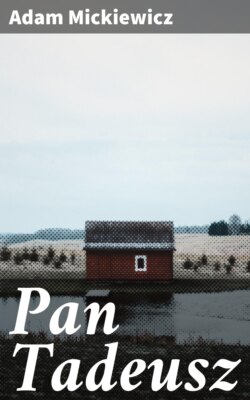Читать книгу Pan Tadeusz - Adam Mickiewicz - Страница 6
На сайте Литреса книга снята с продажи.
LIST OF THE PRINCIPAL CHARACTERS IN “PAN TADEUSZ” WITH NOTES ON POLISH PRONUNCIATION
ОглавлениеTable of Contents
The principal characters in Pan Tadeusz are as follows. The approximate pronunciation of each proper name is indicated in brackets, according to the system used in Webster's New International Dictionary.
Thaddeus (Tadeusz) Soplica [Ta-dĕ'ōōsh Sŏ-plē'tsä].
Jacek Soplica, his father [Yä'tsĕk],
Judge Soplica, brother of Jacek.
Telimena, a distant relative of the Soplicas and of
the Horeszkos [Tĕ-lĭ-mĕ'nä, Hŏ-rĕsh'kŏ].
Zosia, ward of Telimena [Zŏ'shä],
Hreczecha, the Seneschal [Hrĕ-chĕ'hä].
The Chamberlain.
Protazy Brzechalski, the Apparitor [Prŏ-tä'zĭ Bzhĕ-häl'skĭ].
The Assessor.
Bolesta, the Notary [Bŏ-lĕs'tä].
The Count, a distant relative of the Horeszko
family.
Gerwazy Rembajlo, the Warden, formerly a servant
of the Horeszko family [Gĕr-vä'zĭ Rĕm-baĭ'wŏ].
Rykov, a Russian captain [Rĭ'kŏf].
Jankiel, a Jew [Yän'kyĕl].
Maciej (Maciek) Dobrzynski [Mä'chā (Mä'chĕk)
Dŏb-zhĭn'skĭ].
[pg xxiii]
Sprinkler (also called Baptist), Bucket, Buzzard,
Razor, Awl, the Prussian: all members of
the Dobrzynski clan.
Henryk Dombrowski [Hĕn'rĭk Dŏm-brŏf'skĭ].
Otton-Karol Kniaziewicz [Ŏt'tŏn-Kä'rŏl Knyä-zhĕ'vĭch].
The following names are frequently mentioned in the poem: Kosciuszko [Kŏ-shchōōsh'kŏ], Rejtan [Rä'tän], Mickiewicz [Mits-kyĕ'vĭch]. Note also the words wojewoda [vŏ-yĕ-vŏ'da] and kontusz [kŏn'tōōsh].
Polish names in this book are generally given in their original spelling, except that the diacritical marks used on many letters in the Polish alphabet are here omitted, and that on (or om) and en (or em) are substituted for the nasal vowels indicated in Polish by a with a cedilla and e with a cedilla. But the English names Thaddeus, Sophia, Eva, Rosa, Thomas, and Joseph have been substituted for the Polish forms Tadeusz, Zofia, Ewa, Roza, Tomasz, and Jozef. (Yet the Polish title of the poem, Pan Tadeusz, has been left unchanged, as it has become widely known through works on Poland, and as a suitable substitute for it is hard to find: Pan Thaddeus would be a displeasing hybrid.) The few Russian names that occur are given as though transliterated from the Russian, not in the Polish form: Suvorov, not Suwarow.
The Polish Pan, Pani, and Panna correspond roughly to the English Mr., Mrs., and Miss. But Pani may be used of unmarried women of high social station; it is regularly applied to Telimena, and once, by the reverent Gerwazy, even to little Zosia (page 320).
As an aid to the pronunciation of the minor names the following directions may be of some service:—
[pg xxiv]
Accent all names on the penult, or next to the last syllable.
Pronounce cz as ch, sz as sh, rz as zh (azure), j as y (aj, ej, oj as ī, ā, oi). W is ordinarily pronounced as v, but before surd consonants it has the sound f. Ch is pronounced as in German, but before vowels it need not be distinguished from the English h. The Polish l has two values, one of which resembles the English l, while the other (the crossed l) approximates to the English w. S is ordinarily pronounced as in English, but before i it has a sound somewhat like sh; si before a vowel (as in Zosia) has the same sound, the i not being pronounced, but serving as an indication of the “soft” pronunciation of the preceding sibilant. In the same circumstances z (and zi) are pronounced somewhat like zh. The Polish alphabet also contains a dotted z (here represented by plain z) which is pronounced like zh. Dz before i (and dzi before a vowel) are pronounced somewhat like English j in jet. C is ordinarily pronounced like ts, but c before i (and ci before a vowel) are sounded somewhat like ch.
The vowels may be given the familiar “Italian” values; y need not be distinguished from i. (But on i as a diacritical sign, modifying a preceding sibilant, see the preceding paragraph.) Furthermore, i following a consonant (not a sibilant) and preceding a vowel, is pronounced like y, as in Jankiel (Yän'kyĕl).
These rules, it must be said, are incomplete and inexact to a degree that will shock any person with a scientific knowledge of Polish pronunciation. In the present instance brevity seemed of more importance than strict accuracy.
[pg 1]
PAN TADEUSZ
OR
THE LAST FORAY IN LITHUANIA1
